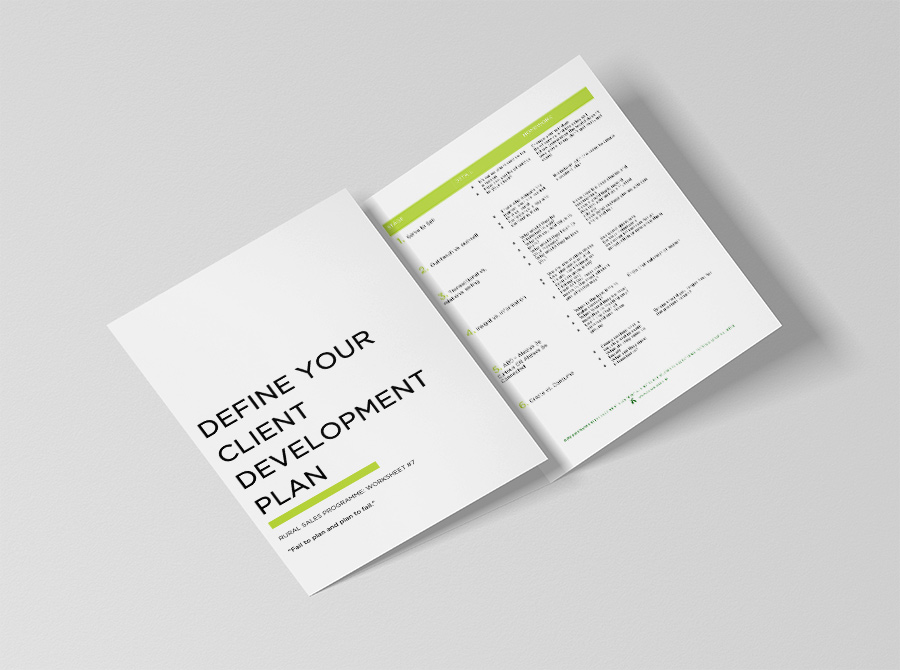Why You Should Fire Some Of Your Farming Clients
The All Blacks have a “no dick heads” policy and so should your rural business.
Dealing with dickhead clients drains a disproportional amount of energy that could be invested far better working with better prospects.
In 4 years of business we have walked away from three clients who weren’t the right fit. And to be fair, we’ve had one or two walk away from us for the same reason.
Collectively those decisions to walk away from clients that didn’t fit with us and our values – which weren’t made lightly – cost us close to $250,000 in lost revenue.
As Bill Bernbach, founder of ad agency DDB and one of the original mad men, said:
“A principle isn’t a principle until it costs you money.”
Look at the energy cost – not the economic cost.
The distraction and disruption of dealing with dickhead clients robs you of the valuable energy you need to serve those who are more deserving of your efforts.
Energy in the long run is far more than important than economics. Just ask Steve Jobs.
All those late night emails and ruined weekends doing above and beyond that fall well beyond your agreed of scope simply aren’t worth it because that effort often isn’t recognised, rewarded or reciprocated.
Instead, you’ve set the precedent and a created rod for your own back. You give more and in turn they expect more. The bar of satisfaction continually rises for you to never hit it.
When you work hard and late in evenings or weekends, you will get grumpy with your wife and kids. It’s super hard on them and not fair on your family. I know this from bitter experience.
Do yourself and your family a favour by politely saying goodbye to those that don’t make a good match.
So What Are The Warning Signs You Need To Watch For?
There are plenty but here are my top ten:
- They don’t return your calls or emails in a prompt or timely manner (preferring master-slave mode hiding behind the facade that their time is more valuable than yours and that they are busier than you when in fact you should both respect each other’s time and workload equally).
- They don’t use your first name in emails (how many seconds does it take to type a first name?).
- They don’t use please or thank you often (manners – as I say to my kids – will always get you more).
- They keep asking for more work outside of agreed scope using veiled threats or bully boy tactics (remember once you make concessions they will keep coming back for more).
- They don’t listen to good advice, recommendations or strategy (they think they know best yet they employed you…how does that work??).
- They pay late (yet boast about the breadth, depth and success of their business whilst they drive their new ute/boat, remember you are not a charity that subsidises their cashflow so be very clear on your payment terms and enforce them strictly).
- They query every estimate (maybe you didn’t demonstrate the value and if this keeps happening you won’t get far, instead work out what they want and put your intervention in clear commercial context that you and they can fairly agree on the value of that impact).
- They mention your competitors often (don’t fall for this psychological bullshit, as a true professional tell them they should go work with them if they want a shoddy or substandard level of service and wish them good luck – don’t put up with threats when you know you are better).
- They block higher buyers and authority (this is a classic case of patch protection and insecurity, this shows they are afraid and fear you as a potential threat that might expose their deficiencies and blindspots to their boss, demand to speak with all decision makers early on or you can’t commit to sending an intelligent and customised proposal which wastes their time and yours).
- They promise much and more in the future but don’t deliver (I always say if they want us to “invest in the relationship” we are happy to do do once we have one).
Multiple Emmy award winner and musical producer Music producer Quincey Jones said it right when he said:
“Ego is just overdressed insecurity”
If your client is open and honest with you on what they do know and what they don’t, you will be able to help them. If they don’t you can’t.
Make sure you create a safe environment where your client can be brave and vulnerable with you. Listen to their situation by putting their interests ahead of you own so you can become their valued and trusted advisor and someone they have the confidence to confide in.
Your first few interactions will tell you almost all you need to know
Like at any interview, you are watching your candidate for the way they treat and interact people, especially people with less power than them. First impressions count.
- Do they treat them with respect?
- Do they remember their name?
- Do they use their manners?
- Are they polite?
- Are they self-aware?
- Do they clear up after themselves?
Screen your customers the same way they screen you.
And remember it’s a sales interview not a sales meeting because it’s always a two-way street. They choose you and you choose them.
My best advice is watch what they do, rather than what they say because talk and platitudes are cheap. Actions say so much more.
“But I can’t just go and fire some of my clients!”
I get it.
Walking away from business is scary, especially when you have employees who depend on you and sales targets to hit.
The good news is when you make the decision to walk away from a client that doesn’t fit you are making a strong statement to the marketplace. You are also respecting yourself and your team and signalling what you will tolerate and what you won’t.
The productivity payback alone more than pays for losing a handful of clients.
Plus your employment brand status will sky rocket as word gets round that you stand up for your staff and have their back, meaning your values actually mean something.
Usually, nine times of ten, any troubling client will already be known for being a bit of a handful. Their reputation will proceed them and the patterns are there for all to see. You won’t be alone in your evaluation.
They might have used several of your competitors before using you. They might have staff who are intimidated, quiet and fearful of speaking up and challenging their superiors. They might even complain about not ever being able to find the right talent.
“Not being able to attract the right talent” is the #1 tell-tale sign to watch out for. It is a significant warning sign for you to watch.
So how do you protect your rural business from this?
The antidote to all of these problems is in preparation.
You have to have a pipeline pulsating with qualified prospects at all times. Building a qualified pipeline takes time, money, energy and effort. It’s no overnight thing.
Of course you need to spend a ton of time looking after clients who look after you. You walk over water for them because they treat you right so you do the same ten fold back. You then need to spend the other 50% of your time marketing and prospecting your rural business so you have more and better options if and when you need them.
You have to communicate consistently. You have to create more compelling content. You have to position yourself as the proven expert in your category. You have to invest in automated lead capture and nurturing software that will build a pre-qualified list. You have to have a website that can wash its own face vs. one that’s a glorified online brochure.
That way you are less fragile, less financially vulnerable or less exposed when you have to say goodbye to clients that won’t and don’t fit.
Remember To Set Expectations Early
Any good relationship works on mutual expectations and boundaries.
We often tell our clients in our terms of trade that if they honour our deadlines we can make theirs. When they pay us promptly, we can get their rush jobs done promptly because we can trust them to pay us and our providers on time. That respect gets them to the front of the line because they value and respect us enough.
You must be crystal clear about what you will put up with and what you won’t.
We use a “What you can expect from us” and “What we expect from you” checklist in all our client agreements. That way there is no misunderstanding from the get go.
Enforce a “3 strike and you’re out” rule – meaning if they pay late 3 times you walk away.
Do You Have Any Degree Of Self-Dignity?
If you have any degree of self-respect for yourself or your rural business you will enforce these things strictly or you’re signalling to your client and your team you lack courage to have the hard conversations and will alway bow to clients who abuse your way of working.
If not wealth will always come before well-being and you erode any self-worth.
Like domestic abuse counsellors counsel their clients: you have to walk away. If you don’t take action to change your situation you reduce your strength and ability to do the same in the similar situation, if it occurs again.
Taking a stand means you have set an standard for yourself on what you will and won’t tolerate. You develop a greater level of self-confidence which signals to others you are not to be mucked or messed around.
As as we all know, confidence breeds confidence.
Like boundaries, if you don’t set your own standards you can’t manage yourself or the people around you who can have a negative impact on your health, wealth and well-being.
You owe it to yourself and your team to hold others to a higher standards so long as you uphold those same high standards yourself.
Apple CEO Steve Jobs was famous for saying:
“We don’t employ smart people and then tell them what to do. We employ smart people who then tell us what to do.”
No truer words spoken – and it seemed to work out well for Apple and their stock price.
Closer to home, it reminds me of the late Sir Brian Lochore who said: “Good people make good All Blacks”.
I got the privilege to meet Sir Brian at a function and he was a humble, self-effacing gentle giant. No ego, no throwing his weight around. He listened to you and your story and shook your hand firmly (and he had big farmer hands!). He was the one that got teams to billet with local families at the 1987 World Cup in New Zealand. He knew it would keep them grounded (unlike the spoilt Australian Open tennis players in Melbourne complaining about mandatory lockdown).
So the story here is work with good ones and ditch the others.
Make them someone else’s problem, preferably your competitors.
You get what you tolerate in this life. Do not tolerate dickhead rural clients because life is too short.
Trust me, they simply aren’t worth it, at all levels, for you or your team.
Walk away from a client today and feel the freedom.
Let me know when you do : )





